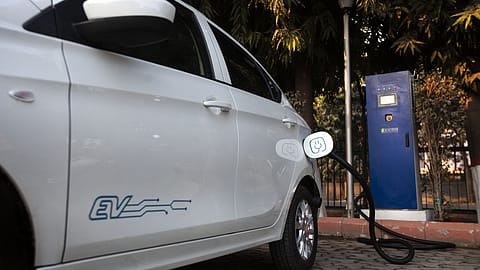Hybrid cars outsell EVs in Sept-Nov period; poor charging infra plays on consumer mind
The current trend of hybrid cars outselling electric vehicles in India is likely to continue in the short term, say experts

Hybrid cars are outselling electric vehicles as India's patchy EV charging infrastructure prompts car buyers to look for fuel-efficient alternatives other than diesel.
Sales of hybrid cars overtook EVs for the three consecutive months through November.
August was the first month when the difference in volumes between EVs and hybrids started narrowing, says Shashank Srivastava, senior executive officer, Marketing & Sales, Maruti Suzuki.
"EV sales in August were 7,787 with hybrids slightly lower at 7,484. In September, hybrid sales were 8,259, overtaking EVs which fell to 7,658. That continued in October, hybrids were 8,673 against 7,024 EVs. In November, hybrids were 7,094 as against 6,763 EVs," says Srivastava.
The faster growth in hybrid car sales comes despite higher taxes on such vehicles. EVs enjoy 5% GST (Goods and Services Tax) whereas hybrids attract 43% GST.
Hybrid cars generally have a lower upfront cost than comparable EVs, making them more affordable for a wider range of consumers, says Harshvardhan Sharma, head, auto retail practice, Nomura Consulting. "This is particularly important in a price-sensitive market like India."
This trend of hybrid cars outpacing EV sales is expected to continue in the short term as there are very few EV models in the mass segment currently, says Puneet Gupta, director, Indian Automotive Market, S&P Global Mobility.
Recommended Stories
To be sure, there are five hybrid car models from 3 Japanese carmakers in the mass market. Toyota, Maruti Suzuki and Honda sell cars in the segment.
As the market for diesel cars narrows, customers will have no choice but to get on to hybrids in the short term and medium term, says Gupta. "With higher upfront costs for EVs, strong hybrids are preferred by fleets and consumers alike." Gupta also attributes robust hybrid sales to better production volumes of Toyota's Hycross and Hyryder. Hybrid sales will grow further as Maruti Suzuki and Toyota are bullish on the segment, he predicts. The two carmakers corner a little less than 50% passenger vehicle market share in the country.
Limitations in the charging infrastructure are also hampering EV sales, according to Sharma. "India's EV charging infrastructure is still under development, with limited public charging stations and slow home charging options. This makes owning an EV inconvenient for many potential buyers who lack access to reliable charging facilities," Sharma explains.
India significantly lags other geographies on charging infrastructure, with roughly 200 EVs per commercial charging point in India, as compared to around 20 in the U.S. and less than 10 in China.
(INR CR)
In the first quarter of the ongoing fiscal, EV sales of the industry stood at 25,200 units while hybrid sales were way lower at 14,400 units. In the second quarter though, EV sales were 23,900 against 22,000 hybrid sales.
Maruti's Srivastava also credits better availability of cars like the Grand Vitara for the rapid rise in hybrid car sales. "Growth in EVs has tapered off. Hybrid as a concept seems to be catching on. Under current circumstances, hybrids are one of the great options due to better fuel efficiency and cost of acquisition," says Srivastava.
According to Bain & Company, a reliable residual value management mechanism is likely to fuel EV penetration in India. But there is still some distance to be covered before that happens. In EVs, used car valuation is still a black box due to low percolating tech for valuation, says Nomura's Sharma.
"It's difficult to predict with certainty which technology will ultimately dominate, but it's clear that both have a significant role to play in India's transition towards a cleaner and more sustainable transportation future," adds Sharma.